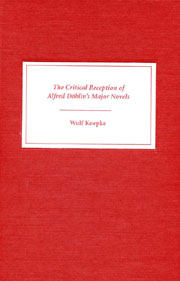Introduction
Published online by Cambridge University Press: 05 February 2013
Summary
ALFRED DÖBLIN WAS one of the great novelists of the twentieth century. Over a period of fifty years he wrote a dozen novels, in addition to a very large number of other fictional, critical, political, and philosophical texts, and was recognized early on as a major avant-garde writer. He has been compared to James Joyce. And yet, only once in his life did he manage to attract the attention of a large audience and of the majority of literary critics: with his 1929 novel Berlin Alexanderplatz. While the (still incomplete) collection of his works now numbers well above thirty volumes, only this one volume seems to matter. Not much energy has been spent on explaining this paradox, since most critics and scholars remain unaware of the dimensions of Döblin's oeuvre. Analyzing the reception of Döblin's major novels may offer answers to the riddle of why this is so.
There is no doubt that the nature of Döblin's texts forbids easy consumption as entertainment. But what exactly is it that makes Wallenstein such a forbiddingly monumental avant-garde epic and Berlin Alexanderplatz a bestseller for the ages? There is by now a sizable body of scholarship, yet this and related questions remain unanswered. Still, the immediate reception of Döblin's novels offers a fascinating insight into German cultural and political history.
- Type
- Chapter
- Information
- Publisher: Boydell & BrewerPrint publication year: 2003



